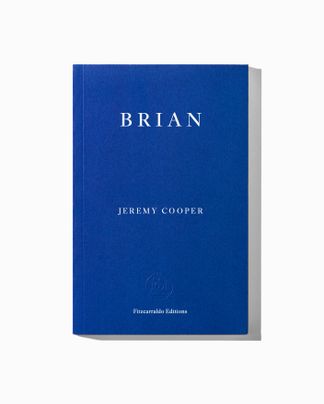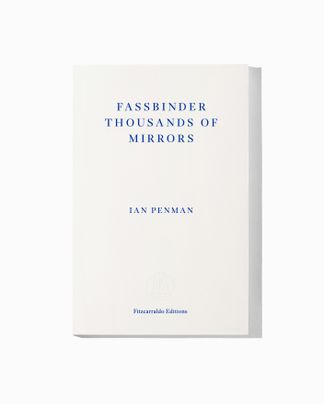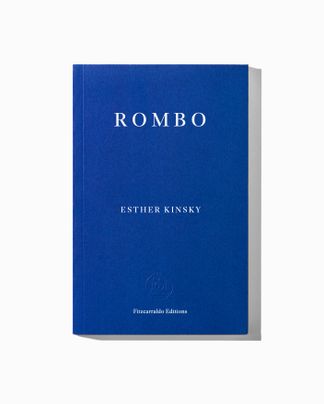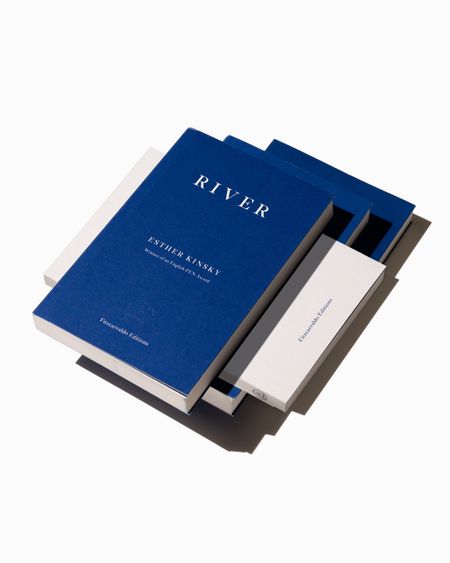While travelling through the Great Alföld, the vast plain in south-eastern Hungary, Esther Kinsky stops in a small town near the Romanian border. Like many other things, the cinema, ‘mozi’ in Hungarian, has long since closed. Entranced by the decaying mozi, she soon embarks on the colossal task of reviving it, compelled by the irresistible magic of the cinema, a site rooted in ritual that is steadily disappearing. Beautifully translated by Caroline Schmidt, Seeing Further is a powerfully eloquent declaration of love to the cinema and the collective experience of watching by Esther Kinsky, one of Germany’s most important contemporary writers.
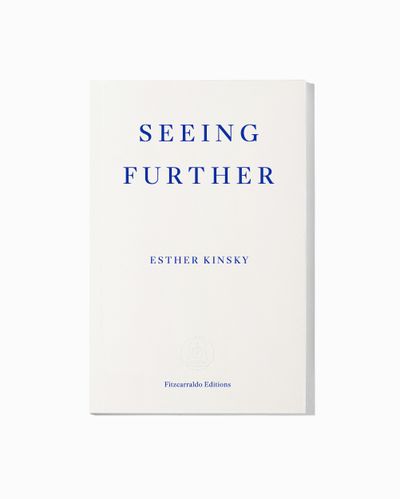
Seeing Further
Translated by Caroline Schmidt
French paperback with flaps, 224 pages
Published 29 August 2024
Seeing Further
Translated by Caroline Schmidt
I. PRELUDE
I spy, I spy with my little eye
Years ago, I was sitting on a bench by a fjord in Norway, far up north. The landscape was dramatic: craggy mountains, dark water, every so often rippled by a gust of wind. Spring had arrived early, bringing the snow to melt under a pale sun. In the unexpected light of that Sunday afternoon a number of people from the nearby university town had set out on foot for a short excursion. They passed by on the path behind the bench, remnant snow crunching beneath their soles, conversing in calm tones, some with muffled laughter; there was something ceremonious about this procession of walkers and, for a moment, without turning around, I imagined I sat with my back to a film by Carl Theodor Dreyer.
A woman joined me on the bench. She appeared as un-Norwegian as I felt myself to be. She was short and plump and, in my memory, she was swinging her legs. For a while we both looked at the dark fjord and then in English she asked where I was from. She herself had fled the war in her native Yugoslavia a few years earlier, and after a prolonged search found a position at the university in the nearby town. She told me about the war and the region from which she came, the flatlands of northern Serbia, a town not far from the Hungarian border. She described the river, the large cornfields and the composition of the cities and villages, where all the roads were laid out as if drawn with a ruler, running ramrod straight from south to north or east to west, and, because the region was very flat, in many places you could see from one end of a street to the other and even farther, to the horizon. As the Norwegian spring day reached its end and her teeth began to chatter from the cold, she expanded on the flatness and vastness of her southern, dusty native district, which in light of our surroundings seemed virtually unimaginable and downright fabulous, and lastly she mentioned that there, in this landscape which had once been part of Hungary and in spirit was still aligned with the Hungarian capital, even though a border now separated it from former Yugoslavia, they said you only needed to climb on a pumpkin to be able to see all the way to Budapest. Imagine that, she said, shivering, just imagine it: You climbed on a pumpkin and up there you could see further, on and on and on.
II.
‘It is seeing which establishes our place in the surrounding world.’
— John Berger, Ways of Seeing
Where to direct the gaze?
There are two aspects of seeing: what you see and how you see it. This investigation into seeing further will involve only the question how. It pertains to the place that the viewer takes. It concerns point of view and remove from the things and images, from the action, proximity and distance, vastness. Vastness is more than physical; it is the scope of possibilities you allow. This applies to looking at a landscape, a terrain, at people, at art. In the past century no location was as important for the how of seeing, for contemplating the place that a viewer assigns themself or takes, as the cinema – as a venue, as a space. This space, whose relevance and significance did not even withstand a century, has been closing ever further in recent decades. The view out of the dark into a vastness created by film grows narrower as this venue for seeing disappears. The collective experience facilitated by this space is disappearing along with it, as is the more-or-less emphatic joy of taking part in these experiential possibilities, and this loss, whether mourned or not, deserves to be described and merits consideration. The cinema was the stage of a century. Today people differ in their relationship to this venue. Why the cinema? After all, films are available in other formats; the black box of the auditorium is considered a necessary venue for seeing by only few, and some even brush off the cinematic experience as an elitist pastime. As if the only thing that mattered any more was the what. And no longer the how.
Despite being relegated to the fringes of the action, the cinema still retains some mythic quality as a venue for seeing. The more the privatization of all experience eats away at our lives, the more fabulous appears a venue where seeing was a collective experience, where wit, terror, dismay and relief found a communal expression without encroaching on the anonymity afforded by the dark room. Even those who never visit the cinema any more will still remember particulars of the experience, of the place; the act of entering into the dark in order to then look out of it; the unspoken, abided by rule of seeing: ‘All eyes in the same direction.’ In the direction mastered by the projectionist, invisible to the audience.
Seeing is a proficiency you acquire. A competence you slowly become aware of. Should you desire. In the beginning there is always the framed view. From the inside to the outside, from a window, whose cutout determines the world for the person looking out. Then comes a discovery: the discrepancy between the way things look from the window and the way they look when you are outside, surrounded by an unframed world, your eye itself now part of the world. A child’s view from the window into a winter morning of hoarfrost and fog remains engraved in the mind as a promise and a mystery; from the garden path or the roadside that same overgrown, rimy terrain rouses confusion, becomes branded in the mind as a memory of the world’s strangeness, which needs sizing up. A winter morning as the first film: a montage from various angles and perspectives. Visiting each window in the house on a quest to watch the outside transform into a series of cut-outs which the contemplating eye alone can read and fill with narrative, whereas outside those same things, relinquished from their frames, become landmarks which the eye’s corresponding self uses to determine their place in that outside. Out there you stood in the world and looked around as far as you could see, the eye always searching for a place to rest, whereas inside, standing by the window, you gazed at a framed fragment which could be ascribed or denied an absolute significance.
Later: binoculars. A new frame, a new, magical metamorphosis via manipulated distances. A fetched piece of yonder, transformed by the frame into a foreign land, into a fiction entirely liberated from its surroundings: the other side of the river, accessed in life outdoors only by crossing a bridge found farther upstream, became available as a result of the binoculars and the view was made obtainable, offering itself up to be filled with ideas entirely unrelated to the vague, blurry contours recognizable to the naked eye, embedded in the familiar gradation of fields, trolley embankment, waterside trees and a notion of the river. Seeing became an adventure, each look through the binoculars was a journey of discovery.
From binoculars to the camera viewfinder. As a child I received a small Russian camera with an inscription in Cyrillic letters. The camera was black and silver, girdled by a brown leather case that snapped onto it, with a protruding part, which could be folded down, covering the lens. The world was reflected on the surface of the lens, distorted to the point of unrecognition, and thanks to a mysterious technical correlation when I looked through the square viewfinder I saw what the eye of the lens saw. Suddenly the world could be divided into pieces, into fragments that became separate entities if you stared long enough through the viewfinder, and even more so later, once the fragments were spread out on the table as photographs and all memory of what had once surrounded these images receded into the shadows. What had been all around could then be reported, related, invented in words; it was excluded from the image. That was a revelation to me. The act of seeing, much more how to look than what to see, had become a decision.
(…)
‘The narrator’s own reminiscences of the last century, “the cinema century,” unfurl a vast cultural memory of moviegoing as a lost form of community, even shelter-taking…. The cinema produces a kind of magic, which we might call the magic of the frame. And Seeing Further, in line after gorgeously elaborated line, tracks the struggle to produce that magic for oneself.’
— Ben Libman, New York Times
‘Kinsky has been interested in looking throughout her career; she takes photographs, writes about photographs, and deploys a photographic literary style. In her latest brilliant [work], Kinsky addresses the topic head-on. The tale of a woman’s attempts to reopen the shuttered cinema, or Mozi, of a remote Hungarian town is interwoven with bittersweet stories about the town’s inhabitants and moody old photographs. Kinsky also reflects on the cinema as a “place of wonder” and a shared cultural institution – one that lets us see beyond the grubby individualism of everyday life…. Her case for the Kino is softly spoken, yet profound.’
— Alexander Wells, The Berliner
‘Kinsky scatters stories into ruminative essays, and a delightful fictional interlude runs up against photography’s grave claims to actuality. She writes in the first person but has, nonetheless, capacious attention for what various townspeople think of bringing the old mozi back to life…. Cinema can affect our perception; it can be an education in looking, and looking well. Proof of that is in the prose here. Coloured by art cinema, Kinsky’s eyes look well at the world, with patient yet lively curiosity.’
— Laura Staab, Sight and Sound
‘Esther Kinsky has created a literary oeuvre of impressive stylistic brilliance, thematic diversity and stubborn originality.’
— Kleist Prize jury
Praise for Rombo
‘Esther Kinsky has more eyes than most; in her novel Rombo she evokes the entire life of an Italian village before, during, and after the two devastating earthquakes of 1976, but each plant and animal central to the village is also a character, and the most important character of all is the landscape itself. The book becomes as much about the futures as the past, for our natural disasters are increasingly man-made, and we need more than ever this reminder of universal impermanence and the marks of memory we leave in its wake.’
— Mary Ruefle, author of Madness, Rack, and Honey
‘A tragic travelogue to the underworld-turned-world that recasts a newly lost Italian past with a climate-wise chorus straight out of the most harrowing Greek drama.’
— Joshua Cohen, author of The Netanyahus
‘In Esther Kinsky’s new novel, language becomes the highest form of compassion and solidarity – not only with us human beings, but with the whole world, organic, non-organic, speaking out with many mouths and living voices. A miracle of a book; should be shining when it gets dark.’
— Maria Stepanova, author of In Memory of Memory
Praise for Grove
‘What makes Grove so noteworthy is the keening, perfectly weighted clarity of Esther Kinsky’s prose; Caroline Schmidt’s elegantly considered translation is meticulous but never overstated.’
— Lucy Scholes, Financial Times
‘This is a sublime book, born of profound, empathetic understanding.’
— Declan O’Driscoll, Irish Times
Praise for River
‘River is an unusual and stealthy sort of book in that it’s the opposite of what it appears to be – which is a rather apt dissimulation, as it turns out. Yes, it rifles through both the rich and rank materials of the world, turning over its trinkets and its tat, in a manner that is initially quite familiar – however, this curious inventory demonstrates an eye for the grotesque and does not hold the world aloft, or in place. Here, details blur boundaries rather than reaffirming them, positing a worldview that is haunted and uncanny. Shifting through unremarkable terrain we encounter the departed, the exiled, the underneath, the other side. We are on firm ground, always; yet whether that ground is here or there, now or then, is, increasingly, a distinction that is difficult and perhaps irrelevant to make. Sea or sky, boy or girl, east or west, king or vagrant, silt or gold; by turns grubby, theatrical, and exquisite, we are closer to the realm of Bakhtin’s carnival than we are to the well-trod paths of psychogeography. Kinsky’s River does indeed force us to stop in our tracks and take in the opposite side.’
— Claire-Louise Bennett, author of Pond
‘Our narrator is an ambulant consciousness open to stimulus, like a video recorder left running. She’s not searching for anything. She’s just there, enduring in the company of rust, moss, dirt, cracks, puddles, half-dead grass, rubbish, wire, random bricks, concrete without purpose, the blackened ground from past bonfires, holes, fragments of fabric, plastic toys, weeds, saplings and dead animals…. [River’s] main subject is the sense of materiality, and its complement, light, that accompanies the narrator from her childhood on the Rhine through sojourns in other riparians homes-from-home, on the St Lawrence in Canada, on the Vistula in Poland…. The form of River mirrors its content; its consciousness flows with a sense that, like water to the sea, it will one day lose itself. It is appropriately, seamlessly translated by Iain Galbraith.’
— Lesley Chamberlain, Times Literary Supplement
‘Rich in atmosphere, River meanders like its liquid locales … Iain Galbraith, who has also translated Sebald, gives River, and all its “lumber of cumbersome jetsam”, a special English poetry of grunge and grime.’
— Economist
‘A magnificent novel.’
— New Yorker
‘Esther Kinsky’s unnamed narrator observes and remembers, piling up beautiful, silt-like layers of description and memory until it becomes difficult to know which is which…. This is a book to relish for its precise descriptions of landscape and weather, for its interest in the detritus of other people’s lives that we routinely overlook, and for its international reach as well as its localized intensities, all wonderfully evoked in Iain Galbraith’s translation.’
— Jonathan Gibbs, Guardian
‘A minor-key masterpiece. Iain Galbraith’s English translation is note-perfect.’
— Jacob Silkstone, Asymptote
Esther Kinsky grew up by the river Rhine and lived in London for twelve years. She is the author of six volumes of poetry, five novels (Summer Resort, Banatsko, River, Grove, Rombo), numerous essays on language, poetry and translation and three children’s books. She has translated many notable English (John Clare, Henry David Thoreau, Iain Sinclair) and Polish (Joanna Bator, Miron Białoszewski, Magdalena Tulli) authors into German. Both River and Grove won numerous literary prizes in Germany. Seeing Further is her fourth book published by Fitzcarraldo Editions.
Caroline Schmidt was born in Princeton. She translated Esther Kinsky’s novels Rombo and Grove, which was shortlisted for the Oxford-Weidenfeld Prize, and has translated poetry by Friederike Mayröcker, and art historical essays, museum catalogues and exhibition texts for Albertina in Vienna and Pinakothek der Moderne in Munich, among others. She lives in Berlin.

